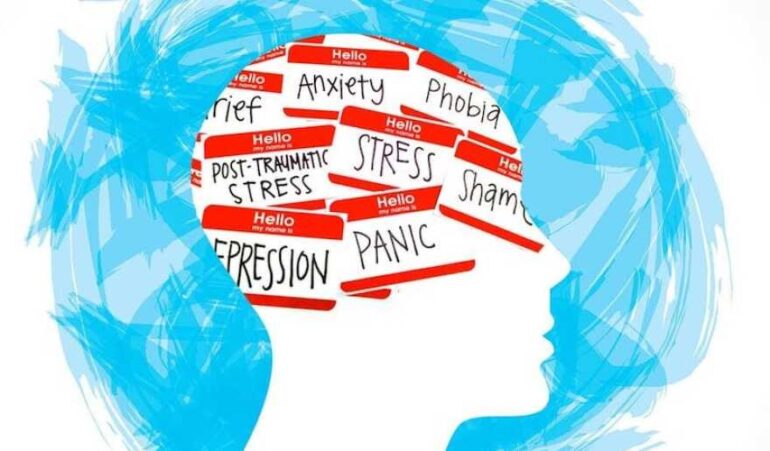Collectively, we have become all too familiar with the exhausting news cycle that seemingly has death and destruction and economic downturns playing on repeat. Mass school shootings. Climate change. January 6th hearings. The war in Ukraine. Now even Monkeypox, recently hoped to be a rare set of cases, has been declared a public health emergency by the World Health Organization.
Terrible news is everywhere, on every channel, and every news stream. Most of us are used to bad headlines, but it seems now that news is both pervasive in our lives and almost entirely negative. So, how do we stay informed and still cope with the deluge of bad headlines?
Yes, we can draw boundaries around our news intake, limiting our time spent and sources consumed. But like a drunken family member who keeps showing up to your party, the news cycle can creep in and hit you through many outlets and directions.
As a social psychologist and an Associate Professor at Fred Hutchinson Cancer Center, I have spent over a decade researching how to help people hear, accept, and cope with the news that they are dying of their illness. Death of ourselves or those we love, and the pain that accompanies it, is probably the news we most fear hearing. That is why COVID-19, school shootings, and now even monkeypox triggers so much fear in us. Each story or headline triggers the ultimate human fear of death. Consuming this news throws us into a space of constant, chronic stress which we were not meant to endure.
Bad news keeps showing up in my life, even when I try to avoid it.
I try to limit my news intake, but the realities of many of these news stories hit me anyway and often when I’m not expecting it. Another American mass shooting gets mentioned during a work meeting. When I go to the local farmer’s market and ask them why all the blooms are falling off my plants before they harvest fruit, I am told the change in weather patterns is causing wetter springs. This is shorthand for: Blame climate change.
And then there are the major headlines that we probably shouldn’t ignore, like the reversal of Roe v. Wade. These are the things that directly impact my life and the lives of those around me.
Of course, self-care and limiting intake is critical. But it is wholly insufficient in our current news climate.
As someone whose professional expertise lies in helping people absorb and cope with the worst news of their lives – death of loved ones, diagnosis of terminal cancer, and even loss of a child – I see firsthand how the same tools that work with terminally ill patients coping with bad news can be useful for anyone dealing with traumatic news.
There are clear ways to handle bad media news cycles and bad personal news cycles.
To be sure, the media exaggerates negative news greatly. “If it bleeds, it leads…” is the common motto of news headlines. What you may not realize is that negative news cycles operate on our brain much the same way drugs do. They both cause us to continue reading, clicking, and consuming. In short, consumption of negative news can become an addiction. And media companies know this and feed our basest desires at our own expense and to their profits.
But a full halt on news consumption is nearly impossible and may not even be the best path.
What I see most commonly in my work with the dying is the avoidance or denial of their terminal illness. But this avoidance does not make their illness go away; instead it robs them of engaging in what would be meaningful time spent in their final weeks of life. Similarly, when we avoid the negative news headlines that are real and not overly exaggerated, we do not prevent those realities from existing. Rather, we ignore the opportunity to make meaningful changes. This is the entire premise of the story in Adam McKay’s recent film, Don’t Look Up!, in which everyone chooses to ignore climate change to the full detriment of the planet and humanity. A scenario that seems to be playing out in our own lives.
Supporting this notion, one research study found that ignoring alarming news, such as the reality of famine in some countries, actually leads to indifference around important issues like poverty and hunger. Reporting on, and the resulting awareness of, major injustices are often what begins to spur social change.
For instance, the live coverage of the storm of the Capitol on January 6, 2021 is what allowed many people who were involved in these attacks to be identified and charged. And it might be, in large part, what is contributing to the pressure for the hearings to take place. And yet, many of us turn away from both the coverage of the Capitol attack and hearings because we don’t want to face the reality of threats against our democracy. Yet, recognizing and acting on those threats is essential to the preservation of that democracy.
In a similar vein, the release of the filming of the death of Floyd at the hands of police is probably the only reason his murderer faced charges. I am wholly convinced Derek Chauvin would have been found not guilty without that footage. The release of this filming also triggered a spur in organizations and individuals to make major shifts to move in the direction of equity and justice. There is still a very long way to go, but it was this reporting and awareness that highlighted the critical need for change. Those most affected by this violence, individuals from the black community, voiced that while most Americans were surprised by these harmful acts, they had been living with them for centuries. This highlights the importance of being aware of the struggle in the world around us to evoke meaningful change.
We may choose not to consume these types of videos, as they can be psychologically hard to take in, but we should remain aware that these things happened. From injustice, we should not look away entirely.
How to Deal
To absorb some of the negative news cycle, however, you must create psychological buffers and spaces of meaning in the midst of sorrow and pain. This is most often done through two routes – immersing yourself in spaces of joy and engaging in meaningful activities and relationships. Supporting this idea, prior research has shown that individuals who have high levels of interpersonal trust – and therefore strong and meaningful connections with others – are less likely to become addicted to news. Those meaningful relationships help buffer against the toxic “doom and gloom” cycle of bad news.
Also, there can be psychological benefits to consuming bad news alongside engaging in rich and meaningful life experiences. This is because mixed emotional experiences hold the power to lead to improvements in psychological well-being. Specifically, experiencing happiness and sadness at the same time leads to psychological well-being. It’s the preface for Susan Cain’s book, Bittersweet, which is that experiencing joy and suffering together actually leads to a greater sense of overall well-being. It’s why losing someone close to us makes us both incredibly sad at our loss and yet incredibly happy at the good memories shared together.
Finally, as someone who walks with many people through the death of a loved one, I would add to this list the notion of purposefully consuming “good news.” This type of news cycle can serve to remind us that overall, much of humanity is in fact good. Projects like Some Good News and SoulPancakepurposefully serve to highlight “good” human stories. Much in the same way that the terminally ill patients I work with find births, children’s activities, celebrations, and weddings to be safe and desirable spaces to live precisely because it reminds them that death is not all that exists in their lives.
Key to all of this is balance.
For all the patients I work with, I would never advise them to consistently read about their illness or scroll through the internet to find all the things about their prognosis that would create stress or fear. But acknowledging and accepting their illness and allowing it to motivate them to engage in meaningful activities, is one of the most powerful benefits of a terminal prognosis that patients express.
I think the same lessons apply to consuming bad news in the headlines.
More from Better:
- Leading in Turbulent Times — Move from Mindfulness to Mind Stillness
- How Can We Stop the Deadly Cycle of Mass Shootings?
- You Said It: Help Blue Heron Foundation Respond to the Humanitarian Crisis in Ukraine

Megan Shen, PhD, is a social psychologist, communication researcher, and Associate Professor at Fred Hutchinson Cancer Center. She is a leading expert on death, dying, grief, and hope.

